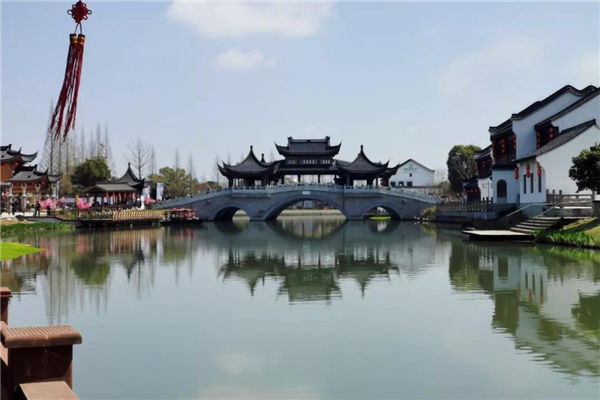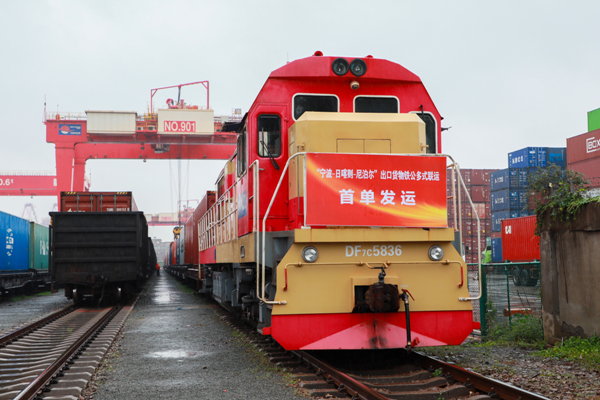China's robotics industry catches up, eyes on higher development
China has been the world's largest consumer of industrial robots for eight consecutive years.
According to statistics released by China's Ministry of Industry and Information Technology (MIIT), the country's robot industry reported revenue of over 100 billion yuan (about $15.7 billion) for the first time in 2020. From 2015 to 2020, the output of industrial robots surged from 72,000 sets to 212,000 sets, with an average annual growth of 31 percent.
So far, industrial robots have been applied in 52 industrial divisions and 143 industrial groups in China, including automobile, electronics, metallurgy, light engineering, petrochemical and medicines.
China's robotics industry has generally established a whole industry chain system that covers spare parts, finished robots, and integrated application, said Wang Weiming, an MIIT official. A number of domestic industrial robot brands are emerging, which are striving to become top-notch globally.
Estun Automation, headquartered in Nanjing, east China's Jiangsu province, is a listed Chinese robotics company that owns complete independent core technologies. It is one of the leaders among Chinese manufacturers regarding industrial robot sales.
Technical director of the company Qian Wei said that following a path of independent innovation, Estun Automation spends around 10 percent of its revenue on R&D. Over 80 percent of the core parts used on the company's robots are independently developed by the company, Qian said.
ROKAE is another Chinese robot manufacturer. Though the young company has been established for no more than seven years, it is seeing robust growth in its business. The self-developed xCore control system of the company is a strong performer among its Chinese peers.
Co-founder Han Fengtao of the company believes that Chinese industrial robots enjoy advantages in the competition with foreign products.
"China has the world's largest market of industrial robots, and the market is expanding with huge potential. Localization is a must for foreign products to win a share in the Chinese market, but domestic manufacturers are obviously closer to Chinese enterprises and are in a better position to learn the latter's demand for industrial robots," Han explained.
According to a development plan for the robot industry during the 14th Five-Year Plan period (2021-2025) issued at the end of 2021, China will build itself into a global hub of technological innovation, high-end manufacturing and integrated application in the robotics industry.
During this period, China aims to achieve breakthroughs in a batch of core robotic technologies and high-end products, and the average annual growth of the robotics industry is expected to exceed 20 percent. The country will also nurture a number of globally competitive and innovative manufacturers of robots, and build three to five industrial clusters with international influence. Besides, the number of robots employed in the manufacturing sector will double.
By 2035, China will become a leading country in the robotics industry, and robots will contribute a major part to economic development, people's daily life and social governance, according to the development plan.
At present, Chinese enterprises are recruiting talents both at home and abroad, learning from advanced overseas experience, and building a global industrial chain through cross-border mergers and acquisitions, to actively exploring new paths of development.
For instance, Estun Automation has acquired, held and invested in many foreign enterprises over the recent years, through which it has rapidly built a whole industrial chain. Besides, the company has also established a R&D center in Europe.
Qian said with a bold human resource strategy, Estun Automation owns core intelligent control parts and solutions developed by its employees from multiple countries, including the U.S., Japan, Britain, Germany and Italy, and has built technical expert teams in robotics and smart manufacturing. It is working to establish a global research network and a multi-level research system that are globally competitive, he added.
ROKAE kicked off its global development strategy last year, too. It has built an R&D center in Japan to absorb advanced experience from the world.
"We'll accelerate our global research strategy and are planning to establish a European R&D center. Hopefully we'll build ourselves into a world-class enterprise in robotics technology by 2025," Han said.

 China makes outstanding contributions to global energy transition
China makes outstanding contributions to global energy transition  Ningbo village inspires Malawi official
Ningbo village inspires Malawi official  A look at China's economic data in the first three quarters of 2024
A look at China's economic data in the first three quarters of 2024 


